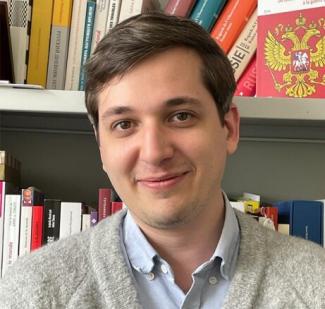Global Focus: Has the War in Ukraine United Europe?
Does the war in Ukraine change the prospect of European Union enlargement? What is the possibility and future of Europe's common foreign and security policy? Does russian aggression unite or unify Europe and what is the role of the European political community? What is Russia's ultimate strategic goal?
1. Before, and ever since, Russia attacked Ukraine, highest Russian officials are saying that they are not attacking Ukraine but rather they are defending Russia e.g. they claim that their military actions are not offensive bu defensive. What is Russia perceiving as a threat and why?
DM : Russia perceives a sovereign Ukraine as a threat to its vital interests. Russia wants to recover its declining influence in the Post-soviet space, and especially in Ukraine, where it believes to have deep historical ties. But Moscow doesn’t want to understand that Kyiv has its own existence, history and future ; Russia led a colonial war against Ukraine that began in 2004 when Ukraine decided to get closer to the euro-atlantic community. Beyond Ukraine, Russia believes that the West tries to undermine its so-called area of interests by supposedly creating color revolutions in the PS space. And there are two problems to this vision. Firstly, Russia denies Georgia and Ukraine the capacity to carry out revolutions on their own, without clear and substantive support from the West. It’s an antihistorical assertion which poses a methodological problem and that historically led Russia to undertake very counterproductive actions, first and foremost for Russia. It’s lied with the historical mindsets and the central beliefs of the Russian mil pol elites. Secondly, Russia gives far too much power to the West, to Washington and Western Europe, which is another historical issue. Russia’s other problem with Ukraine is the fact that Kyiv decided to become a democracy, that is a path that Russia promised to follow as well 30 years ago. Today, while Russia became an autocratic regime, democracy and the rule of law are perceived as a source of instability and an obstacle for influencing Ukraine. Furthermore, democracy is associated with the West, with decadence and Russia did not trust democracy in its history, for many reasons, especially those related to the stability of the Russia’s empire and autocratic regime.
2. Are there any reasons for Russia to feel threatened?
DM : Russia would have no objective reasons to feel threatened if it did not consider Ukraine as its propriety. Ukraine didn’t threaten Russia, Ukraine is a victim of Russia. And the West didn’t objectively threaten Russia either. Russia’s main issue is the beliefs of its mil pol elites: they consider that Russia is a unique and great world power, which deserves a leading role in the world, and at the same time, and for the same reasons, believe being under indirect aggression from the West, supposedly wishing to capture Russian resources and eliminate the so-called Heartland. They pursue greatness at the expense of the foundations of power, yet the latter are supposed to make this greatness credible. Since the Russian mil pol elites believe to have rights for dominating the Post-soviet space, and even exercising a decisive influence on Europe, they act accordingly and adopt an aggressive behavior. It’s very clear that Russia has a very hostile perception of its strategic environment, as a matter of principle, but most of the time, it’s not justified. This belief is deeply and historically rooted in Russia, Putin has just inherited and cultivated it.
3. What is Russia’s strategic goal with this war?
DM : Russia’s strategic goal of its war in Ukraine clearly changed. At the beginning, Moscow launched the special military operation to change Ukraine’s regime because it wanted puppets under its control. Russian military thinkers elaborated a new vision of war since the collapse of the Soviet Union. They thought that it was nowadays better to bypass armed struggle in two ways: either by avoiding interstate armed struggle, or limiting the place of armed struggle in war thanks to the great possibilities of nonmilitary and indirect military means. They successfully avoided interstate armed struggle and reached political goals by annexing Crimea and subverting the Donbass in 2014-2015. But they failed to apply the second way of their theorization. Indeed, they thought that their subversive actions in Ukraine would make the so-called Ukrainian regime collapse with a simple but decisive final armed strike. The failure to implement this strategy forced Moscow to wage a high intensity and protracted war it was not prepared to sustain. Consequently, Russia changed its real goals in Ukraine by redeploying its troops in Donbass. Today and mainly because of its initial mistake of planification and of its inability to adapt, Moscow is losing its war in Ukraine. Today, the Russia’s strategic goal is to defend its annexed territories, not to attack anymore. Russia has lost, its complete conventional military defeat in Ukraine is a matter of time and the first step will likely to save the troops in Kherson, which could be encircled and destroyed there. The next dilemma for Russia with Putin ruling the country without any regime change in Russia might be: either using tactical nuclear weapon, even if it should not have serious military effect and even if the implicit supports of Russia would try to distance from it ; or, the second option is to accept the military defeat, to negotiate peace and probably to leave the Ukrainian occupied territories. But if the situation gets worse, Putin could be directly replaced.
4. Taking all of this into account should Europe feel threatened, is there a need for building common European defence and security? Is that possible? should the whole continent unite and deter Russia?
DM : We Europeans from France, Serbia, Hungary and all other countries of the continent have to understand that Moscow has ambitious plans for Europe. Europe, for at least three hundred years, is the heart of the Russian foreign policy. Europe is a compass by which Russia defines itself. Russia thinks it has rights on Europe, rights to influence and dominate it, hence the importance of the WWII and Yalta in the Russian elites’ cognitive frameworks. To fulfill this historic task, Russia has to destroy NATO and drive Washington out of Europe. Let me remind you the words of Eltsin in 1999, who said to Clinton “Give us Europe”, and Putin who said to Macron in 2018 “We can protect you”. Russia strives to become the protector and the civilizational beacon of the weak and degenerate perceived Europe.
5. Here in Serbia, we often hear that EU and US (collective West as Russian official call them) should stop arming Ukraine and just let Russia have Ukraine and the whole continent will be safe. Ukrainian officials are saying that they are defending not only Ukraine, but Europe from Russia’s expansion. What is your take on that?
DM : The expression Collective West is a way to simplify the reality and the complexity of the international relations. There is a common basis between France, USA, UK and Germany for example, founded on common values, political ideals, culture and history. That is why these countries show a kind of solidarity. But these countries are also competitors and have many differences in terms of interests and approaches. Obliterate these differences lead to simplifying reality and producing false perceptions of intents et behaviors in the international arena. The reality is that the West represents a specific way of life, a specific culture that cultivates liberty and the creativity and autonomy of individuals, that defends the rule of law, searches for peace and prefers negotiation instead of armed aggression. This does not mean that the West doesn’t make any mistake. The issue is that the Kremlin intends to create a new world order, opposed to the post 1945 and 1991 order, as if this order was based on unfairness, the right of the strongest and the tyranny. The reality is that the Kremlin wants a world where it could modify the borders at will, dominate the small countries by intimidation and threat, ignore people’s rights to choose their destiny and so on. What Russia did in Ukraine since eight years, and especially since the beginning of this war is a good illustration of the new world that it wants, where the means used in Russia to submit both the people and elites are applied in its foreign policy. That’s why Ukraine pretends to defend not only Ukraine but also Europe: it is a struggle between a European conception of the world order and a Russian view of the new world order.

Media:

Share





